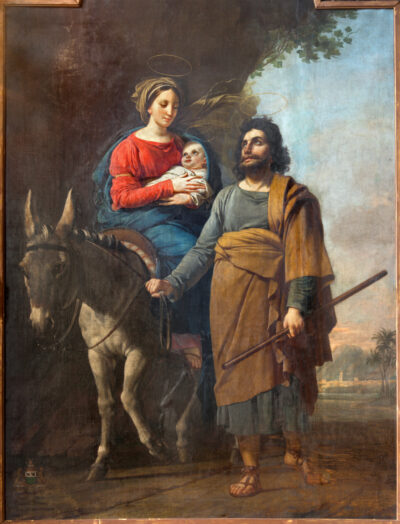Scripture and Migration
In the Old Testament, the Jewish people were deported, exiled, enslaved, scattered and dispersed. In Genesis, Abraham willingly became a migrant in response to God’s command to “Go forth from your land, your relatives, and from your father’s house to a land that I will show you” (Gn 12:1).* He and Sarah extended extensive hospitality to three strangers who were a manifestation of the Lord (Gn 18: 1-15). Following their act of hospitality to these strangers the Lord promises Abraham that Sarah would bear a son the following year. Within the Old Testament, the forced migration of the children of Jacob led to redemption: Joseph, sold into slavery, eventually became the savior of his family (Gn 37:45) – Joseph prefigures Jesus, who, betrayed by a friend for thirty pieces of silver, saves the human family.
The key events in the history of the Jewish people, the Chosen People, such as the enslavement by the Egyptians and liberation by God, led to commandments regarding strangers (Ex 23:9; Lv 19:33). Israel’s engagement with the stranger reflects Gods particular concern for the widow, the orphan, and the marginalized, and embodies the specific Old Testament manifestation of the great commandment to love one’s neighbor: “For the Lord, your God, is the . . . Lord of lords, the great God, mighty and awesome, who has no favorites, accepts no bribes, who executes justice for the orphan and widow, and befriends the alien, feeding and clothing him. So you, too, must befriend the alien, for you were once aliens yourselves in the land of Egypt” (Dt 10:17-19). For the Israelites, these obligations were not only personal exhortations: the welcome and care of the alien were structured into their gleaning and tithing laws (Lv 19:9-10; Dt 14:28-29).

Recalling the migration of the Jewish people out of Egypt, Jesus, Mary, and Joseph themselves were refugees who fled into Egypt (Mt 2:15). In the Gospels, Jesus enters the world during his family’s journey to be enrolled in their ancestral homeland (Lk 2:1-7), where they are denied lodging. The Holy Family flees to Egypt to avoid persecution by King Herod and, even after Herod’s death, cannot return to Israel, but must settle in Nazareth for fear of Herod’s son, Archelaus (Mt 2: 13-15, 19-23). Reflecting on the situation confronting the Holy Family, in his 1953 Apostolic Constitution, Exsul Familia (1952) Pope Pius XII referred to them as an archetype for all migrants.
St. Matthew also describes the mysterious presence of Jesus in the migrants who frequently lacked food and drink and are detained in prison in his Gospel (Mt 25:35-36). Jesus himself speaks of the “Son of Man” who “comes in his glory” (Mt 25:31) who will judge his followers by the way they respond to those in such need: “Amen, I say to you, whatever you did for one of these least brothers of mine
you did for me” (Mt 25:40). In his itinerant public ministry, Jesus has nowhere to lay his head (Lk 9:58), his own people refuse to accept Him (Jn 1: 11), and He tends to those who move “like sheep without a Shepherd” (Mk 6:34).
During his ministry, the Nazarenes revolt against Him and drive Him away (Lk 4: 28-30). The Scribes and Pharisees plot against Him and repeatedly accuse Him of breaking the law, while they themselves fail to live according to its spirit (Mt 22: 15-22; 23: 23-27) and fail to grasp that love of neighbor fulfills the law (Rom 13:10; Gal 5:14). Jesus teaches that nations will ultimately by judged by how they treat the dispossessed and needy, including the stranger (Mt 25: 31-46). Migrants fall within every marginal group set forth in the Judgment Day parable, the hungry, thirsty, stranger, naked, ill, and imprisoned.
The Risen Christ commanded his apostles to go to all nations to preach his message and to draw all people through faith and baptism into the life of God the Father, Son, and Holy Spirit (Mt 28:16-20). The triumph of grace in the Resurrection of Christ plants hope in the hearts of all believers, and the Spirit works in the Church to unite all peoples of all races and cultures into the one family of God (Eph 2:17-20).
* For all references to Scripture, please refer to the Bible posted on the USCCB website: https://bible.usccb.org/bible.
